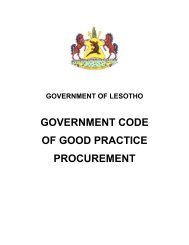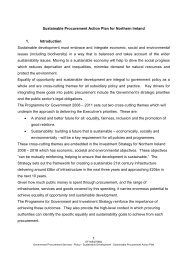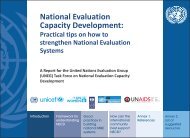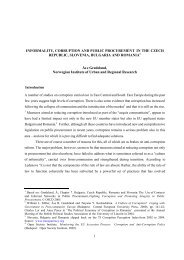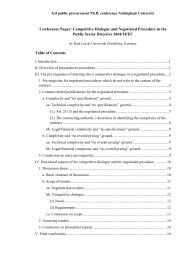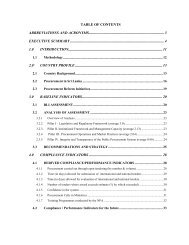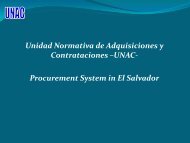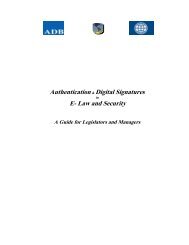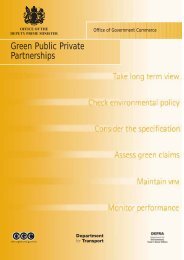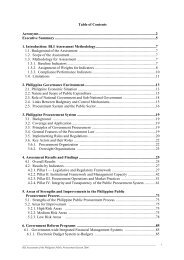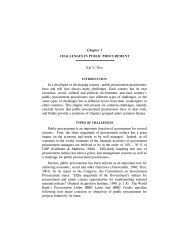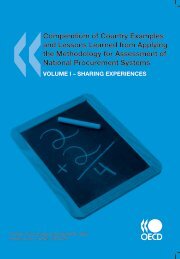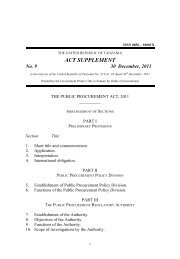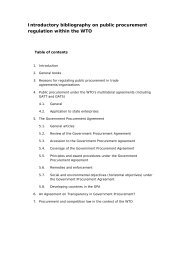The Public Procurement Rules 2008 - LGED
The Public Procurement Rules 2008 - LGED
The Public Procurement Rules 2008 - LGED
You also want an ePaper? Increase the reach of your titles
YUMPU automatically turns print PDFs into web optimized ePapers that Google loves.
81. Use of Direct Cash Purchase. |— (1) <strong>The</strong> Procuring Entity may undertake direct<br />
cash purchase of low value Goods and urgent and essential Services such as maintenance,<br />
repairs, transportation and others in the value and annual aggregate amounts specified in<br />
Schedule II.<br />
(2) <strong>The</strong> Procuring Entity may undertake any Purchase under this rule by an officer or a<br />
purchase committee, comprising maximum three members, formed by it for this purpose,<br />
depending on the nature of the purchase.<br />
(3) Payments for Purchase under Sub-Rule (1) may be made by cash or cheque and a<br />
purchase order or contract shall not be required.<br />
82. Use of Force Account. |— (1) Force Account may be used for hiring of direct labour<br />
for departmental needs in the value and annual aggregate amounts specified in Schedule II.<br />
(2) Materials, tools and rental of additional equipment required to perform departmental<br />
Works under Force Account may be procured using other procurement methods such as RFQ or<br />
Direct Contracting under Rule 76.<br />
PART – 6<br />
INTERNATIONAL PROCUREMENT<br />
83. Conditions and Procedures for Open Tendering with International Competition<br />
for <strong>Procurement</strong> of Goods and Works etc. |—) (1) For the purposes of fulfilling the provisions<br />
of Section 33 of the Act a Procuring Entity shall comply with the following additional requirements<br />
for International Tendering -<br />
(a) the time allowed for the submission of Tenders shall be sufficient to allow the<br />
invitation to reach all potential Tenderers and to enable them to prepare and<br />
submit Tenders and in the case of notice inviting re-tender shall be as<br />
specified in Schedule II.<br />
(b) technical specifications shall be based upon international standards or those<br />
widely used in international trade and such standards shall be compatible with<br />
those in use in Bangladesh.<br />
(c) where the Bangladesh standard is thought to be unique, the words “or<br />
equivalent” shall be added to allow for wider competition.<br />
(d) the acceptable currencies in which the Tenderers shall be permitted to express<br />
their Tenders and any Tender or performance securities to be presented by<br />
them as well the currency or currencies in which the contract price will be paid<br />
shall be stated in the Tender Document.<br />
(e) the Tender Document may allow for a domestic preference as defined in<br />
Schedule II. I to provide local manufacturers, Suppliers and Contractors with a<br />
price advantage over their international competitors for the purpose of<br />
promoting domestic products or industries.<br />
(2) If a <strong>Procurement</strong> Entity decides, in the case of <strong>Procurement</strong> of Goods, that an<br />
international open Tender shall include domestic preference, Tenders will be classified in the<br />
following groups, namely -<br />
(a) Group A which shall comprise Tenders offering Goods manufactured in<br />
Bangladesh for which labour, raw materials and components from within<br />
Bangladesh make up more than thirty percent (30%) of the ex-Works (EXW)<br />
price of the Goods and the production facility in which they will be manufactured<br />
or assembled has been engaged in manufacturing or assembling such Goods<br />
67



